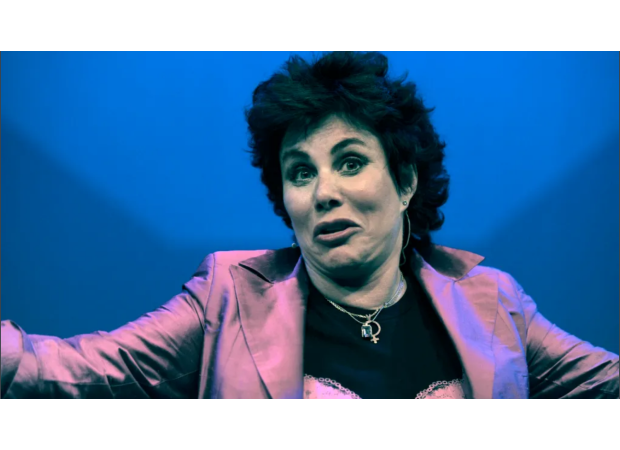I was embarrassed when Comic Relief revealed my secret.
Fear of losing my job if my issue was discovered.

Ruby Wax looks back on the moment when she first realized the repercussions of opening up about her struggles with mental health. It was a time that left her feeling overwhelmed, as she unintentionally became a spokesperson for mental illness. Despite this, the 71-year-old British-American actress and comedian has never shied away from speaking out about her own battle with bipolar disorder and depression.
For 12 years, Ruby was able to manage her conditions with medication. However, in 2022, while staying at a monastery, she suffered a relapse that left her feeling as though she was possessed by the devil. This experience led her to voluntarily admit herself to a psychiatric clinic for five weeks, where she relied on both professionals and her family (her husband, Ed Bye, and her two children) to help her through.
Now, looking back, Ruby is using her experiences, both positive and negative, as inspiration for her return to the West End with a one-woman show entitled "I'm Not As Well As I Thought I Was". This show, based on her best-selling book of the same name, sheds light on the dark moments of her life. With her signature humor, Ruby takes the audience on a journey through her pursuit of meaning, from swimming with humpback whales to embarking on a 30-day silent retreat and even joining a Christian monastery.
But it's not just about the laughter for Ruby. She candidly discusses her tumultuous mental health journey, sharing all the ups and downs. However, this wasn't always the case. In fact, there was a time when Ruby was scared to reveal the truth, for fear of losing everything. In an exclusive interview with The Agency, Ruby reveals what inspired her to become a voice for mental health. She also reflects on her earlier work with Comic Relief, who used her image on a confronting poster in London's Tube stations.
"I was scared I would be fired if anybody found out that I had a problem," she confesses during the interview, sitting in a hotel room in Oxford with her colorful nails catching the eye. "Comic Relief put a poster of me up in Tube stations that said, '1 in 4 people have mental illness, 1 in 5 people have dandruff. I have both.' I was so mortified that they outed me."
It was this experience that led Ruby to write about her struggles and vow to be a voice for those who couldn't speak out. But she wants to make it clear that her shows are not therapy sessions. They are simply her way of opening up a conversation about mental health and encouraging others to do the same.
During her performances, Ruby creates a sense of togetherness with her audience, often inviting them to participate in a Q&A session. She is hyper-aware that she is not alone in her experiences, and that many others have been through similar struggles.
"I think the audience does say, 'Oh, yeah...that would be me too,'" she says. "Even if you don't have a mental illness, you are fragile. We live in a frazzled culture, and everybody feels in a high state of fear, and we want out. Yet it keeps pulling you back because we still live with unresolved issues. There is a high degree of loneliness and a high degree of not looking at who we really are because who has time? We have these fantasies that we'll find happiness if only we 'get' something, you know? And advertisers know how to tickle that nerve. We think, if I just have that, if I just find this place, if I just do these extreme things...of course, it's an illusion."
But don't get it twisted – Ruby's shows are not just about mental health. She has plenty of other stories to share and wants to be known for more than just being a spokesperson for mental illness. She also wants to dispel the notion that her shows are just a way for her to vent or for her to find catharsis. For Ruby, it's about making people laugh and then sneaking in a few truths among the funny lines.
"I like to make a really big imprint rather than have people say, 'That was shallow,'" she says. "I think it's going to be another really powerful run of shows."
And Ruby's impact goes beyond her performances. She is touched by the courage of strangers who share their own mental health struggles with her, and she finds it rewarding when she receives positive feedback from fans.
"If they meet me after the show, I love it. I just love the way people talk to me," she says. "They're not saying, 'Oh, I liked you in show business.' They're saying, 'Thanks a lot for writing some of your books because I felt really helpless.' That's a real reward."
Ruby, who first gained fame as a comic interviewer, is returning to the West End this September for a sold-out run of performances at the Ambassadors Theatre. She is excited to leave a lasting impression on her audience and predicts some memorable moments ahead.
"It's not a b****ing session; it's not therapy; it's not the news...it's just asking, 'What's the weather condition like inside your brain?'" Ruby says of her show. "If you can make somebody laugh, then you can give them any message because you deserve their attention. You deserve to be taken seriously. You know people who get up and say, 'Poor me?' I don't want to see that show. So for every 20 amusing lines, I try to sneak one in that's truthful."
Despite being a positive force for change in the mental health community, Ruby wants people to know that she is not defined by her struggles. She is a multi-talented performer who has been a regular on British TV since the 1980s. So, as she returns to the West End, she hopes to leave her mark on fans and be remembered for more than just being a "whiner".
"Got a story?" Ruby asks. "If you've got a celebrity story, video or pictures, get in touch with The Agency entertainment team. We'd love to hear from you."






